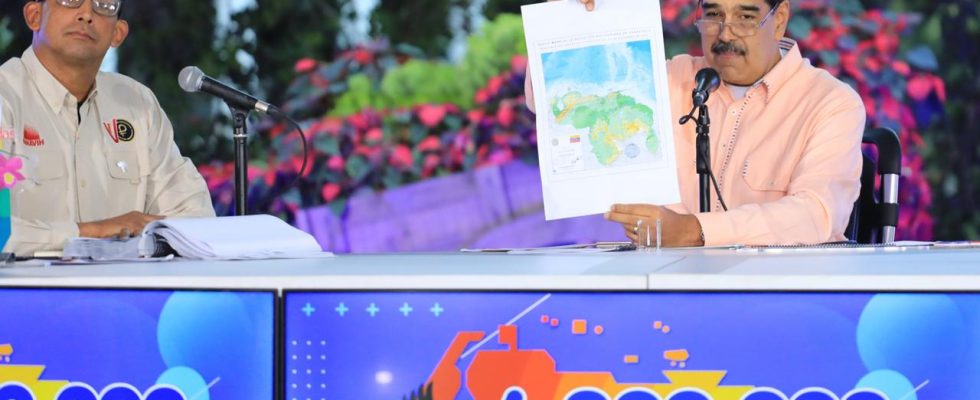The UN Security Council will today discuss Venezuela’s annexation plans for resource-rich Guyana. Under international law, President Maduro’s claims are baseless. Is President Maduro only interested in oil reserves?
Venezuelan President Nikolas Maduro is rattling his sabers, demonstrating strength shortly after a referendum he held on the question of annexation.
He proudly presented a map of Venezuela in front of the camera – with new borders: “We have taken the first steps of a new historical stage. We are fighting for what is ours. To win back what the liberators left us. Essequiba Guyana. That “The Venezuelan people have spoken loud and clear, this victory belongs to the entire Venezuelan people.”
Controversial referendum
In the highly controversial vote last Sunday, according to the official results, more than 90 percent of voters were in favor of the partial annexation of neighboring Guyana. Voter turnout was reportedly 50 percent.
Independent observers and the opposition doubt the result. Media and citizen portals posted pictures of deserted polling stations.
María Corina Machado, founder of the political movement Vente Venezuela and winner of the opposition primaries, which wants to run against authoritarian Nicolás Maduro in next year’s presidential elections, told France 24 that the referendum was clearly a means of getting away from the big one to distract from the success of the opposition primaries and to inspire patriotism in order to rally voters behind them.
Last Friday, the International Criminal Court ordered Venezuela to “refrain from any action that would alter the current situation in the disputed territory.” The actual decision in the conflict may take a long time.
Maduro follows up
This doesn’t seem to bother Maduro: He has already announced that he wants to declare the Essequibo region a Venezuelan province by law. He also ordered the state oil company to “immediately” issue licenses for oil production in Essequibo.
The conflict came to a head again after the oil company ExxonMobil discovered an oil deposit in the area in 2015. A few months ago another find was made in the region. Guyana’s reserves are now estimated at more than ten billion barrels. That is more than the deposits in Kuwait or the United Arab Emirates.
Analyst and political scientist Benigno Alarcón from the Catholic University Andrés Bello doubts that the government in Caracas is primarily concerned with oil. He cannot imagine a violent invasion. Alarcón doesn’t believe there will be a war: “Maybe a skirmish at the border, but nothing more. The whole thing has more to do with domestic political reasons. The referendum served as a test for the mobilization machinery. But that went completely wrong.”
What Maduro risks
Maduro recently had very low approval in surveys. The country has been in a political and economic crisis for years and has suffered from US sanctions. In recent years, almost eight million people have left the country; now 28 million people still live there.
In the end, Venezuela would isolate itself internationally as the conflict escalates, said Alarcón. Because what was possibly intended as a move for negotiations with the USA could also backfire.
Maduro runs the risk of the easing of US sanctions being lifted, which are tied to the creation of the conditions for democratic elections.
Region supports Guyana
Maduro had promised the USA that democratic elections would be held in 2024. In return, the United States eased sanctions against Venezuela’s oil and financial sectors. He would jeopardize this agreement by escalating the conflict.
He would also lose support in the region, says the political scientist. “He would be seen as an aggressor. Above all, the Caricom countries, the Caribbean community, will not welcome that.”
Likewise, it puts other countries that are actually allied with Caracas in an unpleasant situation – such as Brazil, which has a border with Guyana. Likewise Cuba, the country also has interests in Guyana – and China, which has already invested there.
The neighbors react immediately
Brazil has already announced the reinforcement of its military border force in the north. Venezuela’s ally China called on the two countries to resolve the dispute.
Guyana says they are prepared for all scenarios. They are looking for a diplomatic solution and are preparing with allies and friends to be able to defend the Essequibo if necessary, Guyana’s President Ali told the US broadcaster CBS.
In view of the tense situation between Guyana and Venezuela, the US armed forces want to show their presence with flights over the territory of Guyana.
More repression
Venezuela’s Attorney General’s Office, which is close to the government, has meanwhile requested arrest warrants against 14 opposition figures. Attorney General Tarek William Saab explained that the suspects had tried to torpedo the referendum. The accused include, among others, the former President of Parliament Juan Guaidó.
In the following weeks, political scientist Alarcón expects that Maduro will reinforce the Venezuelan military on the border with Guyana – “but without crossing the border of the territory; more to demonstrate that he is serious. Nothing more will happen for now. He wants to maintain his credibility.”
At the moment, it seems that Maduro is losing more than he is gaining by maneuvering and fomenting conflict.
Anne Demmer, ARD Mexico City, tagesschau, December 8th, 2023 11:41 a.m

